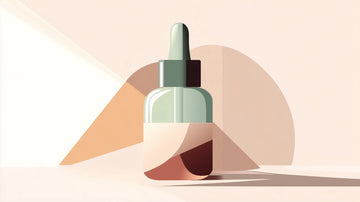Menopause is a unique chapter in life. It begins as early as in your forties and is accompanied by a series of hormonal changes that can affect everything, from sleep to mood to hair.
Regarding hair specifically, the decrease in estrogen and progesterone levels that occurs during menopause can trigger natural changes that enhance the effects of DHT (a hormone involved in hair follicle miniaturization) and deprive hair follicles of the vital nutrients needed for their growth. But by combining a balanced diet with dietary supplements, you can give your hair exactly what it needs to grow during menopause.
Below we present the five main nutrients for healthy hair growth during menopause, as well as the best foods to obtain them. In addition to changing your diet, a regimen such as Iconique Collagène is a good way to get all these nutrients (and more!) to take control of your hair health during menopause.

Vitamin D
The role of vitamin D in maintaining the balance of our body extends to hair health. This vital nutrient helps reduce the inflammatory response, support a healthy immune system, and promote balanced blood sugar levels.
When these three elements are not in harmony, a number of health problems, including an alteration in hair growth, can occur.
Vitamin D also helps the body to properly absorb other important nutrients such as zinc, selenium, iron, and calcium that influence hair health.
Where to find it? Vitamin D is found in foods such as salmon and other fatty fish, mushrooms, enriched animal and plant-based milks, pork (particularly pork chops), and eggs.
Vitamin C

Powerful antioxidant, vitamin C helps protect the cells in our body against damage caused by oxidative stress. This is particularly important as we age and our internal levels of oxidative stress increase.
Collagen, which is essential for strengthening and supporting our hair follicles, can be damaged by this stress. This has a dual impact on hair during menopause, when our ability to produce collagen and effectively respond to oxidative stress naturally decreases.
Vitamin C helps us produce collagen and fight against the stress factors that damage cells. It has also been observed that Vitamin C has a significant effect in reducing sensitivity to dihydrotestosterone (DHT), the hormone linked to the slowing down of hair production and regrowth.
Where to find it? The best foods rich in vitamin C are guava, kiwi, bell pepper, tomato, papaya, strawberry, broccoli, kale, and orange.
Collagen

We now know that the natural production of collagen decreases when we reach the age of menopause, but it is even more affected by menopause itself.
This phenomenon is partly due to the decrease in estrogen, which, under normal circumstances, strives to protect and enhance the production of several components of the skin, such as collagen.
With reduced collagen production, many menopausal women report a sudden aging of their skin. This decrease in collagen can also impact scalp repair, as well as the repair of blood vessels, which are essential for supplying nutrients to hair follicles.
When choosing a collagen supplement, studies show that hydrolyzed collagen (which has been partially broken down from its whole form) is easier for our body to absorb.
It has also been demonstrated that hydrolyzed collagen improves skin hydration, elasticity, firmness, and texture in postmenopausal women when taken regularly, especially when used with other dietary supplements.
Where to find it: Foods that contain collagen include, in particular, bone broths, salmon, and eggs. With dietary sources of collagen being rarer, Iconique Collagène is an excellent way to obtain this nutrient. The hydrolyzed collagen used in Iconique Collagène is bioavailable (i.e., more easily absorbed) and is sustainably sourced from the scales of North Atlantic cod.
Iodine

Iodine and thyroid health go hand in hand, as iodine helps control thyroid function and is essential for the production of our thyroid hormones.
A lack of iodine has the power to stop the production of thyroid hormones, which has a considerable impact on metabolism, mood, energy, and hair growth.
Regarding hair health, balanced thyroid hormones are necessary to send the signal to the hair follicles to initiate and sustain growth. Issues related to thyroid hormones are generally associated with thinning and fragile hair.
Thyroid health deserves special attention when we reach menopause because, as we age, the efficiency of iodine uptake and the amount of thyroid hormones produced by our body decrease.
In order for our thyroid to function optimally, it is recommended to consume adequate amounts of iodine (150 mg per day for adult women).
Where to find it: Iodine-containing foods include seaweed, white beans, sea fish, seaweed, Lima beans, cow’s milk, cheese, and eggs.
Zinc
Zinc, which impacts everything from DNA synthesis to collagen production, enables the hair growth cycle to function optimally. When zinc is present in insufficient amounts, oxidative stress, inflammation, and DNA damage are likely to increase.
That is why zinc is so essential during menopause, a period when the body is already facing increased oxidative stress factors and produces less collagen. Zinc plays a role in hair health by converting food into fuel for the hair growth cycle.
Furthermore, adequate zinc levels are essential for stimulating hair growth. Low levels of zinc can hinder hair growth, leading to hair graying and increased hair loss.
Where to find it: A number of zinc-rich foods can be included in your diet, including oysters, meat, lentils, hemp seeds, lentils, oats, and shiitake mushrooms. The daily intake of zinc should not exceed 40 mg, unless otherwise advised by a doctor. You can obtain an effective dose of 25 mg of zinc by taking Iconique Collagène.
With love, the üma team.






